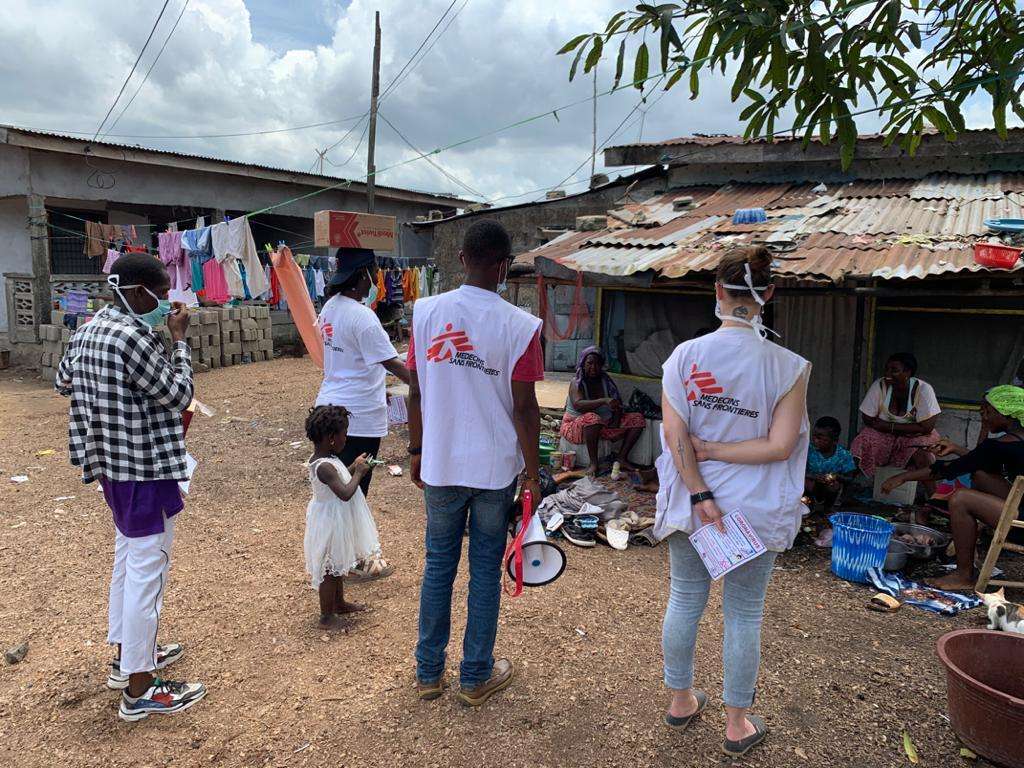NEW YORK/MONROVIA, Liberia, October 6, 2020—The COVID-19 pandemic has created many challenges for mental health and epilepsy patients in Liberia, leading to greater social isolation and disrupting treatment in some cases.
Doctors Without Borders/Médecins Sans Frontières (MSF) helps treat more than 1,400 people with epilepsy or mental illnesses in collaboration with five health facilities in and around the capital, Monrovia. The clinical program is reinforced by teams of psychosocial workers and volunteers in the communities, promoting mental health services and supporting families in caring for patients. Many activities were disrupted, however, after COVID-19 appeared in Liberia in March.
"We had to work differently to protect staff and patients because of the risks of COVID-19," said Justine Hallard, MSF mental health project coordinator. "Instead of seeing patients in homes and health facilities, we started giving consultations to most of our patients by phone and distributing medications each month outside."
Confirmed COVID-19 infections peaked in June, although testing remains limited. After a nationwide lockdown, the government lifted a series of restrictions, and MSF-supported health facilities resumed in-person care for most mental health patients in July and August. An additional 140 patients enrolled in treatment, while an MSF team began making home visits to more than 30 patients with severe conditions who could not come to health facilities.
"We are finding too many cases when patients went off treatment and relapsed while we could not see them," said Emmanuel Ballah, MSF mental health supervisor. "People who left the city because of COVID-19 initially could not return because of travel restrictions, while others did not have cell phones for us to reach them, so they could not pick up their medications when we organized a monthly distribution."
People with disorders as varied as epilepsy, depression or schizophrenia are at greater risk of harm when treatment is not available. Even before COVID-19, the World Health Organization found that three out of four people with a mental or neurological disorder did not receive medical treatment in low-income countries such as Liberia, which often leads to uncontrolled symptoms and exclusion from schools and workplaces. The appropriate medications are often not available in Liberia, even in the country's only psychiatric hospital. This is especially true this year, as COVID-19 has affected the overall Liberian economy, as well as medical supplies and services.
In Liberia, a leading cause of death among epilepsy patients is drowning caused by uncontrolled seizures while bathing or drawing water from a river. Others may suffer from inadequate care by their family members in times of increased hardship, isolation and uncontrolled symptoms.
"The COVID-19 crisis put patients in an extremely vulnerable situation," Hallard said. "Families have been struggling even more to care for patients at home. We have unfortunately seen 22 deaths in the first nine months of this year among our cohort of patients, after we saw 17 deaths all of last year. These may be due to their medical conditions or to negligence by their caregivers."
The experiences of this year have only underlined the importance of supporting families and communities in caring for people with mental health and neurological disorders. Following up with patients who stopped treatment prematurely is an urgent priority for MSF's mental health team.
"We recently saw an 11-year-old boy who was suffering from uncontrolled epileptic seizures," said Marieke van Nuenen, MSF's mental health activity manager. "The boy had stopped coming to the clinic in June. His family is very poor and they live in an abandoned factory in a rural area. As we were talking to his family, he had several seizures and appeared very distressed. He could not walk, was suffering from malnutrition and needed to be hospitalized."
His condition improved with treatment at MSF's pediatric facility in Monrovia, Bardnesville Junction Hospital, but his seizures continued. Through home visits, the MSF team is still adjusting his medication to further reduce his seizures.
"We often need several weeks or sometimes a month or more, to adjust the treatment to prevent seizures," van Nuenen said. "We've been increasing the treatment with the advice of our hospital pediatrician, and the boy is doing better, having fewer seizures. His family is very happy now that they see the medication is working."




